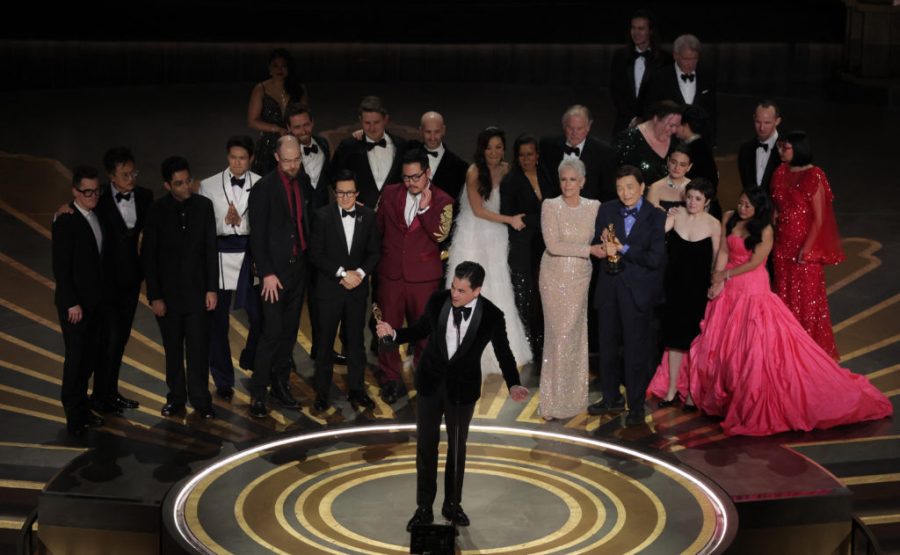Poor Things, directed by Yorgos Lanthimos, featuring Emma Stone, William Dafoe, Mark Ruffalo, and more, and adapted from the novel of the same name authored by Alasdair Gray in 1992, is about Bella Baxter, who is brought back to life by an unorthodox scientist, Godwin Baxter, who runs off with a lawyer on a whirlwind adventure across continents. Free from the prejudices of her times, she grows steadfast in her purpose to stand for equality and liberation.
As the movie hit theaters, and many took to their keyboards to review the movie, there was confusion amongst viewers as Bella Baxter’s version of “fighting the patriarchy” was not exactly what was in mind.
The film is more eccentric than what the logline or even trailer could have led on. A tale of horror, mischievous, drama, adventure, and action; the film, set in Victorian London, definitely hit all the bases for an incredible movie. Not to mention the spectacular set design– Alice in Wonderland (1951), meets Wes Anderson.
Bella Baxter (Emma Stone), has been brought back to life after her suicide by the orthodox scientist Godwin Baxter (William Dafoe). Upon resurgence, her brain is replaced with that of a child, whom she was pregnant with.
Baxter has a medical assistant, Max McCandless (Ramy Youssef), who falls in love with Bella. With Baxter’s blessing, the two get married. Her brain ages rapidly, so she becomes more curious about the outside world. With this newfound curiosity, she leaves McCandles for Duncan Wedderburn (Mark Ruffalo), a lawyer, and escapes from the four walls she had been boxed in.
Duncan and Bella head for Lisbon, to live with each other and away from London. A generous way to describe their time in Lisbon is as the “honeymoon” of their relationship, as well as part of Bella’s exploration of her sexuality and the wonders of life.
The issue that comes up with this is… does Bella know what is going on? Following the film, she still hasn’t become an adult yet. This leaves us with the issue of consent. Wedderburn liked the idea that Bella essentially didn’t know the concept of “no”. The film is set in Victorian London, however, this film is sci-fi, so the argument of “time accurate” is immobile.
Bella’s mind begins to expand more, which causes Duncan to lose control of her. In a last-ditch attempt, Duncan smuggles her onto a ship headed to Paris. Baxter befriends Martha and Harry, who open her to philosophy. After being scammed of their money, they can’t afford the direct trip to Paris and leave the ship at Marseilles.
Short of money, Bella begins to work at a brothel where she befriends Toinette, who introduces her to socialism. Godwin, the orthodox scientist, asks McCandles, his medical assistant, to bring Bella back. He manages to track her down by tracking Duncan. After being brought back to London, she agrees to go through with the plan of marrying Max.
The wedding between Bella and Max is interrupted by her estranged husband, Alfie Blessington. She once again leaves Max at the altar, for Alfie. She is curious about her past life and wants to learn what it was like through Alfie. During this time, she realizes why she left and attempted, and once again sought to escape.
In an attempt to disable Bella, it backfires against Blessington, and following a series of events, Toinette, Max, and Bella all replace his brain with that of a goat, and carry on the work and legacy of Godwin.
On paper, it truly does sound like a formative experience. A woman reclaims her life from the men who so desperately want to take it away from her, take away her person. It is ultimately a story of resistance, suffrage, and overcoming any barriers life gives to you. What makes that exceptional is it is a tale of a woman who is unafraid to be herself, which is why Emma Stone, known for her loud and bright personality, was an on the nose casting choice.
Lanthimos, director of Poor Things, has actually shied away from labeling the film, stating that it “becomes one-dimensional” and wants films and filmmaking to be “more open than that”. This seems like a cop-out, as it is hard to disocciate a woman in Victorian London defining societal norms, (long black hair, loud personality, etc.) from being feminist. This weak statement to avoid confrontation and bad press strengthens the argument that this film and it’s story-telling is a male’s version of feminism. Especially when the films official logline explicity states that Baxter is “steadfast in her purpose to stand for equality and liberation”.
Do these things happen in real life? Absolutely. But the movie’s intent wasn’t to shed light on child prostitution. When asked about Baxters time as a prostitute, Lanthimos argued that he had no qualms of portraying that time in her life as “educational”, when asked to confront it with the harsh reality of prostitution. Argued that it “had the same tone to the rest of the film”, he failed to reason how to connect this with its history.
It would have been refreshing to see Bella learn more about the world; its wars, racism, poverty, the hierarchy, the patriarchy, dance, music, culture, all the things that make up a person, their worldview, and their opinion.
If female liberation through sexuality was the goal, then menstrual cycles, contraceptives, body hair, and such should’ve been mentioned, if not, the main focus.
The actress portraying Bella, Emma Stone, responded to this critique of nudity in an interview, defending the sex scenes in the film. “But I just see it [sex] as one aspect of many to her– her discovery of food or philosophy, travel and dance.”
Bella indeed learned more about the world and its mindsets and ways of thinking. The issue that lies with this was that it was overshadowed by that one aspect of her growth. It is also important to consider that salaciousness and nudity are not as favored or sought out– in media– as it was. According to this annual report from Teens & Screens, many of “Gen Z” wanted less nudity on camera, and more character focuses on their lives and platonic relationships with each other. 47.5% of respondents voted that nudity was not needed in media, and 44.3% wanted more platonic relationships to be highlighted in media.
With these statistics in mind, can it be argued that Poor Things will be effective in promoting female freedom of choice? We see Bella conversing and learning more about the world and its food and its philosophies, which is empowering as, when we look back to the “great minds”, such as Socrates, Homer, etc., all are men. For a woman to have that knowledge– which couldn’t be taken away from her– was empowering. It is why the argument that nudity overshadowed all the other aspects that Baxter holds, that Stone mentioned, exists.
The United States Census (1960) even reported that “Fewer of today’s young women will be spinsters all their lives than was true a generation or so ago.” during The Sexual Revolution. During this time, many woman began to go on birth control, reffered to as “The Pill”, and had the freedom to indulge and express their desires, just like men. When so much of feminism has been women tearing down a border that men have put up between us, many of our experiences, as women, have been defined by men. Van Badham of The Guardian put it perfectly: “Sexual freedom has become another realm of women’s experience for patriarchy to conquer.”
It is why Barbie, directed by Greta Gerwig, did an amazing job battling this issue; Barbie learned about the hardship of women through a mom and daughter, through the women of the real world. Not from Ken, the Mattel CEO, or anyone else.
To cohere, Poor Things was an eccentric, horror, engaging, and colorful film. It’s an instance where something looks pretty, but up close… not so much. Interpretation differs from viewer to viewer, and requires critical thinking as well. Be sure to watch Poor Things, and analyze the film with this knowledge.















